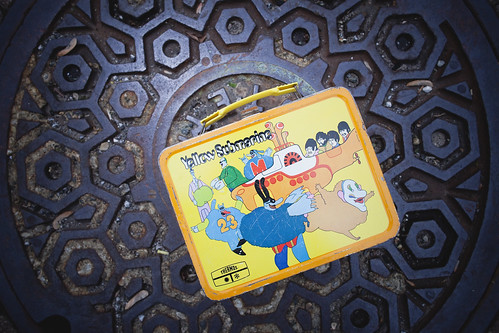Via Flickr:
From Hot Collectible Lunch Boxes Preserve the Past
Photo: Jim Merithew/Wired.com
Tuesday, 20 December 2011
Yellow Submarine lunch box
Star Wars lunch box
The owner would of been the talk of the playground!
Via Flickr:
From Hot Collectible Lunch Boxes Preserve the Past
Photo: Jim Merithew/Wired.com
Friday, 28 October 2011
Beatrice Potter (Webb) on Sidney Webb
 |
| Sidney Webb, 1930s |
Beatrice Potter recorded in her diary her first meeting with Sidney Webb (14th February, 1890)
"Sidney Webb the socialist dined here to meet the Booths. A remarkable little man with a huge head on a very tiny body: a breadth of forehead quite sufficient to account for the encyclopaedic character of his knowledge, a Jewish nose, prominent eyes and mouth, black hair, somewhat unkempt, spectacles and a most bourgeois black coat shiny with wear; regarded as a whole somewhat between a London card and a German Professor. To keep to externals: his pronunciation is cockney, his Hs are shaky, his attitudes by no means eloquent - with his thumbs fixed pugnaciously in a far from immaculate waistcoat, with his bulky head thrown back and his little body forward he struts even when he stands, delivering himself with extraordinary rapidity of thought and utterance and with an expression of inexhaustible self-complacency. But I like the man. There is a directness of speech, an open-mindedness, an imaginative warm-heartedness which should carry him far. He has the self-complacency of one who is always thinking faster than his neighbours, who is untroubled by doubts, and to whom the acquisition of facts is as easy as the grasping of matter; but he has no vanity and is totally unself-conscious."
An interesting and beautiful description of another human being and, perhaps one of the best expressions of love at first sight that I have ever read.
You can read and compare the manuscript and typescript version of this extract on the LSE Digital Library. Trust me, there is a mountain of incredibly interesting text here that can be used to tell amazingly resonate stories.
Related sources: LSE News archive; New Statesman.
In a digital world no book is an island
This is a derivative work based on content in the LSE Digital Library and on the LSE Library Flickr stream. The text is CC licensed and the image has 'No known copyright restrictions'
Monday, 3 October 2011
LSE Library Political Posters
LSE Library Political Posters, a gallery on Flickr.
Via Flickr:
A selection of posters from the LSE Library Archives collection.
Sunday, 2 October 2011
LSE Library Selection
LSE Library Selection, a gallery on Flickr.
Via Flickr:A selection of some of the best photos on flickr by, or of, LSE Library.
Monday, 26 September 2011
Some work thing
Monday, 19 September 2011
Saturday, 10 September 2011
Talking to Machines
3 million people a month talk to Cleverbot!
Over 65 million conversations and some lasting as long as 11 hours!
Fascinating, funny and ever so slightly unsettling.
Over 65 million conversations and some lasting as long as 11 hours!
Fascinating, funny and ever so slightly unsettling.
Sunday, 4 September 2011
Saturday, 3 September 2011
Creating solutions is not the same as finding them
Another great SlideRocket. One for the teachers.
http://portal.sliderocket.com:80/app/FullPlayer.aspx?id=fcb63499-a733-4556-9a6c-5b7abc314e0b
Thursday, 1 September 2011
Where does all this library stuff come from?
using MARC and Google to visualise
This is what happens when you take a large and generally representative sample of MARC records from your library, match up all the publication location codes with the Library of Congress MARC standards code list, put the numbers into a Google Doc, and run the 'Heatmap' gadget.
There was a reason to me having done this, but that reason no longer remains relevant. It was hard graft crunching data, so it would be a shame for me not to explain what it is and share. If you hover over the countries the numbers that you are faced with can be taken as the number of items from that country. Don't get hung up on them though, it's a sample and they would be better if they were percentages.
And what do I think of it? Well, clearly the US, UK, France and Germany are where most of the material comes from. Considering the history and background of the library which this data was sourced from I am not overly surprised that stuff published in Russia stands up quite well. Is that Soviet Russia though?
In isolation I guess the conclusions and comparisons that can be made are limited. In lieu of other libraries doing roughly similar things I'll never know the distinctiveness or uniqueness of this collection. One thing is sure though, that this collection is truly global in its coverage.
There was a reason to me having done this, but that reason no longer remains relevant. It was hard graft crunching data, so it would be a shame for me not to explain what it is and share. If you hover over the countries the numbers that you are faced with can be taken as the number of items from that country. Don't get hung up on them though, it's a sample and they would be better if they were percentages.
And what do I think of it? Well, clearly the US, UK, France and Germany are where most of the material comes from. Considering the history and background of the library which this data was sourced from I am not overly surprised that stuff published in Russia stands up quite well. Is that Soviet Russia though?
In isolation I guess the conclusions and comparisons that can be made are limited. In lieu of other libraries doing roughly similar things I'll never know the distinctiveness or uniqueness of this collection. One thing is sure though, that this collection is truly global in its coverage.
Tuesday, 16 August 2011
Panoramio
I love it! About a month ago I put up 20 odd photos onto Panoramio just to see what happened. I'd forgotten about it for a couple of weeks and then popped back thinking I might expand the collection I had on there. I was shocked by the number of views the pictures I had posted received. This one of the Western Wall in Jerusalem picked up nearly 500 views (mainly through Google Earth) in no time at all. Why? I wondered. I hadn't tagged it with anything salacious. I hadn't really tagged it at all.
I've put some more on now and I've been surprised with the popularity of them as well. I guess people like browsing Google Earth and looking at pictures. Geographical browsing is obviously a popular thing. I'm pleased by that.
Having looked at my local area and place of work I'm now keen on posting more. Anything to raise the profile of both seems a good thing to me. Sharing a little snippet of the world, one picture at a time. Who knows what interest all these millions of pictures will be to people in the future.
Check them out here. Do you do anything similar yourself? If so, what do you use? I'd be really keen to know.
I've put some more on now and I've been surprised with the popularity of them as well. I guess people like browsing Google Earth and looking at pictures. Geographical browsing is obviously a popular thing. I'm pleased by that.
Having looked at my local area and place of work I'm now keen on posting more. Anything to raise the profile of both seems a good thing to me. Sharing a little snippet of the world, one picture at a time. Who knows what interest all these millions of pictures will be to people in the future.
Check them out here. Do you do anything similar yourself? If so, what do you use? I'd be really keen to know.
Friday, 22 July 2011
Sunday, 17 July 2011
SlideRocket
Decided to give SlideRocket another go for a presentation I need to give. I haven't got the patience to make a decent, non-vomit inducing Prezi, but hope that we will be using Prezi for a brain storming exercise.
I've been getting some inspiration and come across the 'Girl Effect' presentations. Well worth a look as they not only promote what you can do with SlideRocket but the message will probably move you as well.
I've been getting some inspiration and come across the 'Girl Effect' presentations. Well worth a look as they not only promote what you can do with SlideRocket but the message will probably move you as well.
Saturday, 16 July 2011
George Bernard Shaw
I have been thinking a lot recently about George Bernard Shaw and his involvement with LSE. I have had access to a lot of early material related to him and have found it really interesting. Stories about GBS and the history of LSE are as relevant today as they ever were and ones which need to be told. The landscape of UK HE is changing dramatically and new opportunities have arisen, yet with them comes great challenges. Connecting with our shared past can help give vigour to our actions and our vision of what we want to be, and where we came from.
Stories like the 'Man and the Cameraman' project by LSE Library and the Exhibitions Group work, both online and physical, are raising awareness, widening access and building the reputation of the institution as a whole.
We should dig for more stories. The Digital Library will bring a wealth of material into the wider global domain such as the Webb Diaries and the Booth Maps. I'd like to see us digitise the Clare Market Review and historic copies of The Beaver to continue with the story and engage alumni with publications they would be familiar with.
A few quotes from Shaw that I quite like:
Stories like the 'Man and the Cameraman' project by LSE Library and the Exhibitions Group work, both online and physical, are raising awareness, widening access and building the reputation of the institution as a whole.
We should dig for more stories. The Digital Library will bring a wealth of material into the wider global domain such as the Webb Diaries and the Booth Maps. I'd like to see us digitise the Clare Market Review and historic copies of The Beaver to continue with the story and engage alumni with publications they would be familiar with.
A few quotes from Shaw that I quite like:
“If you leave the smallest corner of your head vacant for a moment, other people's opinions will rush in from all quarters”
“Progress is impossible without change, and those who cannot change their minds cannot change anything.”
“We must always think about things, and we must think about things as they are, not as they are said to be.”
Wednesday, 13 July 2011
Subscribe to:
Comments (Atom)
















































